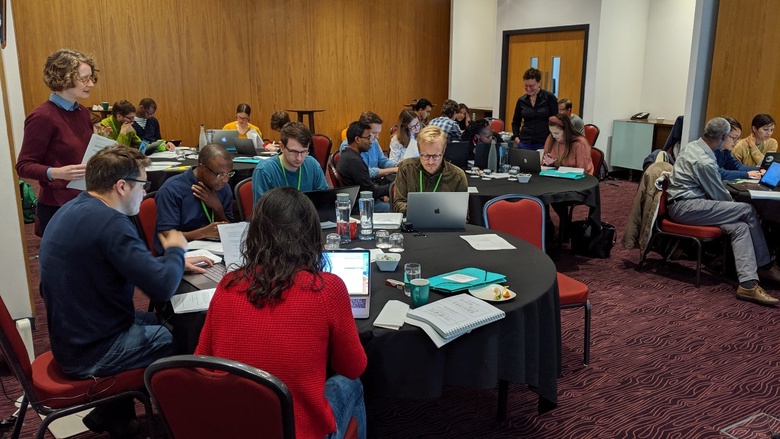In 2019, the Methods of Benefit Valuation team in HERU delivered our ‘Using Discrete Choice Experiments in Health Economics’ course twice. The course teaches one of the most commonly used preference elicitation tools: the Discrete Choice Experiment (DCE). In 2019, we held our annual course in Aberdeen, and also held a course in Banff, Canada in collaboration with University of Calgary’s Professor Deborah Marshall, Dr Gillian Currie and Dr Karen MacDonald.

Group photo from the Aberdeen DCE course in November 2019.
There are more details on the course at the ‘Workshops and Training’ section of the HERU website. The Aberdeen course will be offered again from 29th September to 1st October 2021. Registration details are available from the course site on the HERU website.
Mandy Ryan and Verity Watson have been teaching the course since 2003. Luis Loría joined the teaching team in 2016. The course has changed over the years, but our main objective has remained the same: teaching how to conduct a DCE with a focus on health applications.
We want participants to leave the course both inspired and empowered to do their own DCEs. For this, we teach the whole process of designing a DCE: from study conception to interpretation of results. We try to make the course as hands-on as possible. There are three main components to the course:
-
Taught sessions which focus on the theory behind DCEs.
-
Group work sessions which provide participants with hands-on experience of each stage of a DCE project.
-
Practical sessions which link the two together.
We also use state-of-practice computer software to teach people how to design and analyse DCE data.

Group photo from the Canada course in September.
Over 40 people participated in our 2019 courses. Participants came from a range of backgrounds – they were health economists, qualitative researchers, and clinicians from both academia and industry. The diversity in the professional experience of participants was matched by geographical diversity. Reflecting the increasing and wide-spread application of DCEs, we had participants based in places as far afield as South Africa, Australia and India. Indeed, this year we had five continents represented on the course.
Over 400 people have taken this course since 2003. Past courses have led to academic collaborations, PhD supervisions, completed research projects across the world and even a World Health Organisation User Guide. We look forward to hearing about our participants’ research and outputs!
A few words from this year’s participants:
“The course was a real treat - it was run excellently by Mandy, Verity and Luis with the presentations clear and well structured and has made me much more confident to run a DCE from start to finish".
“I've enjoyed the course (and Aberdeen) a lot, well done to the entire team for such professional organisation and delivery. I came here by recommendation from a colleague and will certainly recommend it to others”.
“Outstanding course. Thanks!! I hope you'll see a few publications from me (that are related to the course). That won't be a bad measure of success”.

Mandy Ryan presenting at the DCE course in Canada.

Group work at the Aberdeen DCE course.
Thanks to Luis Loría Rebolledo for his work developing this Blog post.

HERU is supported by the Chief Scientist Office (CSO) of the Scottish Government Health and Social Care Directorates (SGHSC). The views expressed here are those of the Unit and not necessarily those of the CSO.


